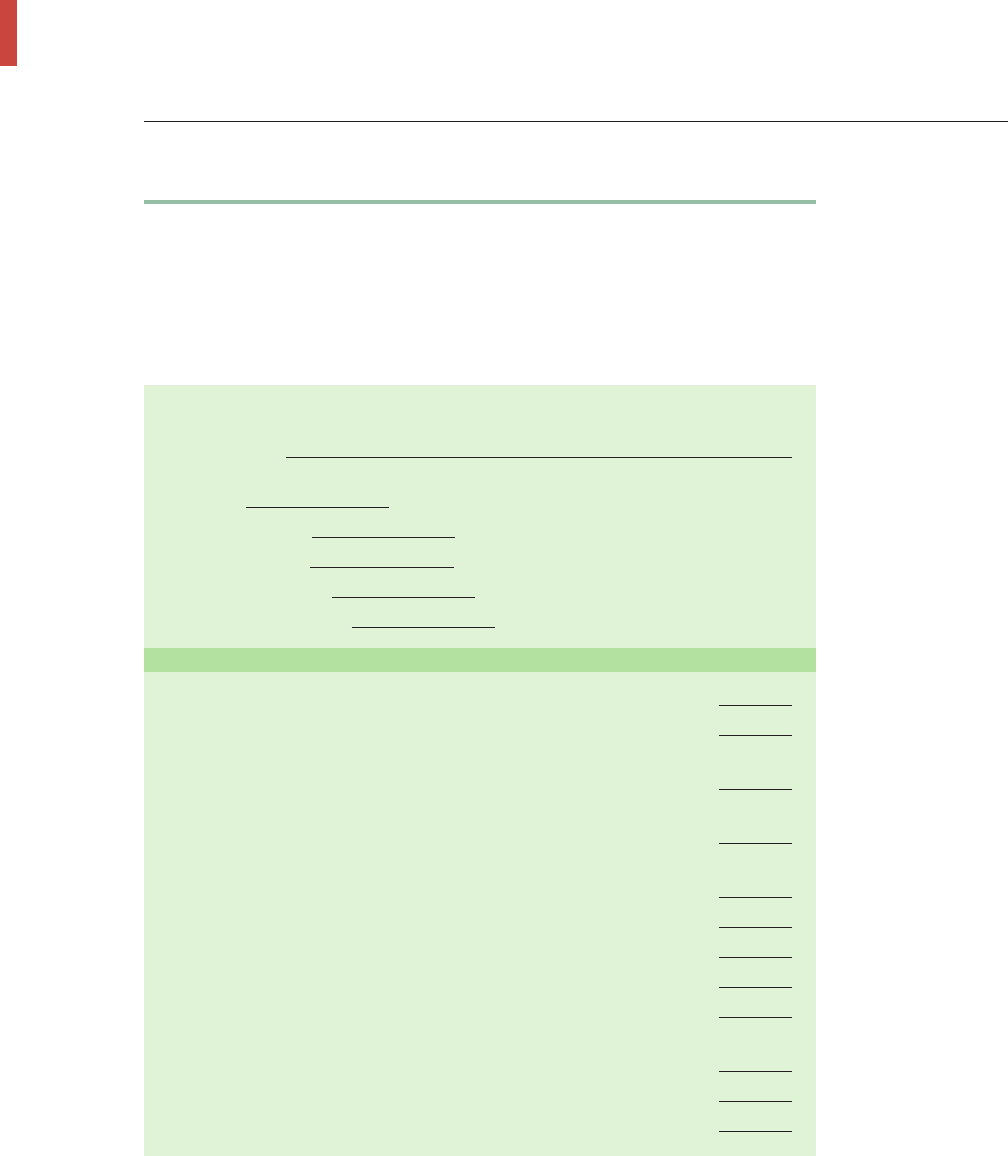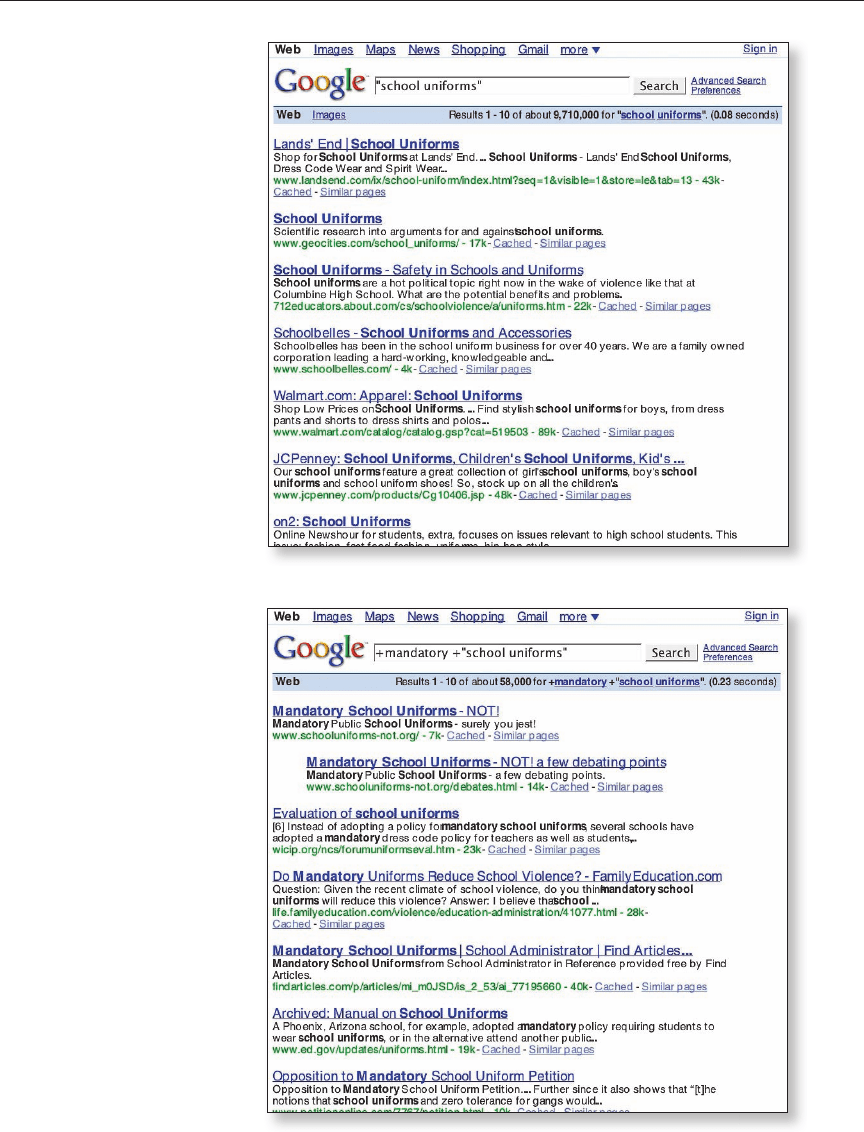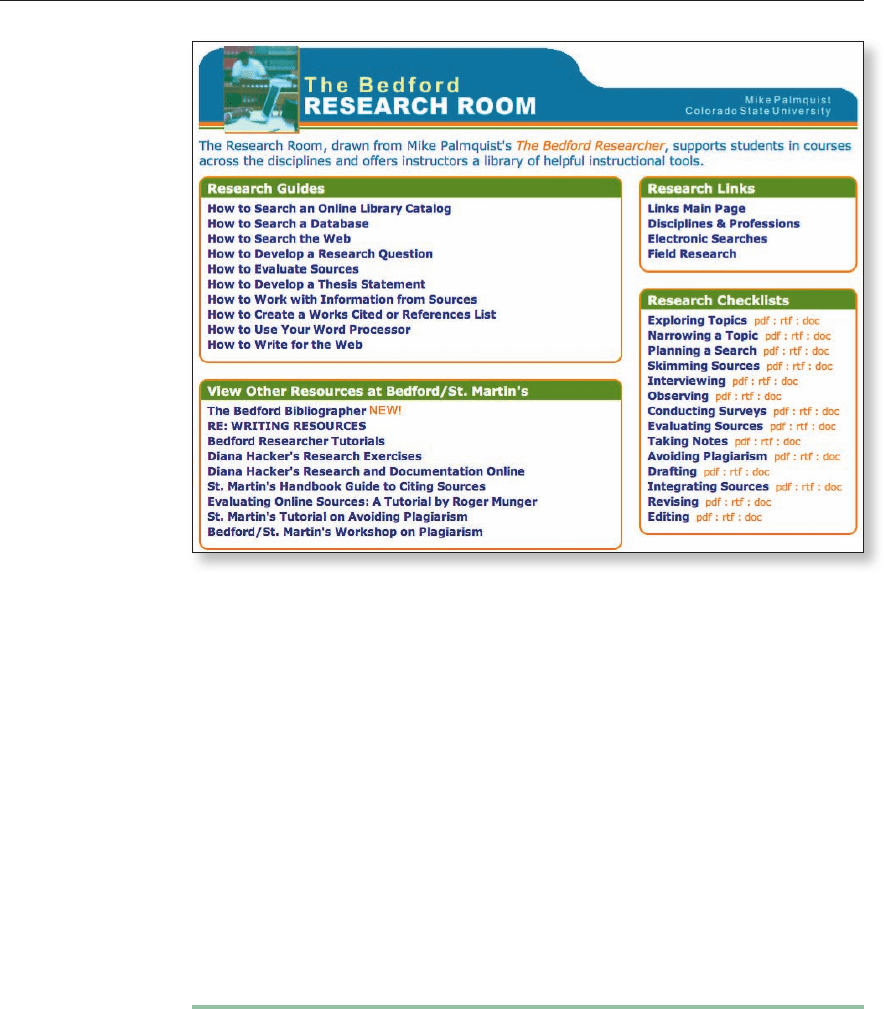Anker Susan. Real Essays with Readings with 2009 MLA Update
Подождите немного. Документ загружается.


WRITING ESSAYS
Chapter 21 • Writing the Research Essay 347
SAMPLE RESEARCH ESSAY SCHEDULE
Assignment:
(Write out what your instructor has assigned.)
Length:
Draft due date:
Final due date:
My general topic:
My narrowed topic:
STEP DO BY
Choose a topic.
Find and evaluate sources.
Take notes, keeping publication information for
each source.
Write a working thesis statement by answering
a research question.
Review all notes; choose the best support for your
working thesis.
Make an outline that includes your thesis and support.
Write a draft, including a title.
Review the draft; get feedback; add more support if needed.
Revise the draft.
Prepare a list of Works Cited using correct documentation
form.
Edit the revised draft.
Submit the fi nal copy.
Make a Schedule
After you receive your assignment, make a schedule that divides your re-
search assignment into small, manageable tasks. There is no way that you
can do every step the day (or even a few days) before the assignment is
due, so give yourself a reasonable amount of time.
You can use the following schedule as a model for making your own:
■ TEACHING TIP
Walk students through
the process of creating
a schedule, starting
with the date the essay
is due and working
backward. Suggest and
discuss the amount of
time they should allow
for each key step.
ANK_47574_21_ch21_pp346-382 r4 ko.indd 347ANK_47574_21_ch21_pp346-382 r4 ko.indd 347 10/29/08 10:13:57 AM10/29/08 10:13:57 AM

WRITING ESSAYS
348 Part Three • Special College Writing Projects
Choose a Topic
Your instructor may assign a topic, or you might be expected to think of
your own. If you are free to choose your own topic, fi nd a subject that you
are personally interested in or curious about. If you need help, try asking
yourself some of the following questions:
1. What is going on in my own life that I want to know more about?
2. What have I heard about lately that I’d like to know more about?
3. What am I interested in doing in the future, either personally or
professionally, that I could investigate?
4. What famous person — living or deceased — most interests me?
5. What do I daydream about? What frightens me? What do I see as a
threat to me or my family? What inspires or encourages me?
6. Is there something I do in my spare time (sports, music, computer
games) that I’d like to know more about?
POSSIBLE TOPICS FOR A RESEARCH ESSAY
Assisted suicide Marijuana for medical purposes
Causes of stress Medical insurance
Childhood obesity The minimum wage
Date rape Music downloading
Dieting/eating disorders Online dating services
Ethics: business/political/personal Outsourcing jobs to foreign countries
Executive salaries Patients’ rights
The family in America Pets and mental health
Gambling Presidential campaigns
Gay/lesbian marriage/adoption Reality television programs
Global warming Rights of children of illegal immigrants
Gun control Road rage
Identity theft Sexual harassment
An illness Standardized testing
Internet games Violence in cities
Limiting cell phone use Violence in the media
Mandatory drug testing Women in military combat
Mandatory school uniforms
■ TEACHING TIP
Have students select
three of these top-
ics to write about in
their journals. Their
journal entries should
answer the following
questions: Why does
this topic interest me?
What would be my
purpose in writing
about this topic? What
audience would be
interested in reading
about this topic? Why?
ANK_47574_21_ch21_pp346-382 r4 ko.indd 348ANK_47574_21_ch21_pp346-382 r4 ko.indd 348 10/29/08 10:13:57 AM10/29/08 10:13:57 AM

WRITING ESSAYS
Chapter 21 • Writing the Research Essay 349
■ For more on
narrowing a topic,
see Chapter 4.
When you have a general topic, jot down some answers to these questions:
1. Why is this topic interesting to me? How does it affect me? What do I
hope to gain by exploring it?
2. What do I know about the topic? What do I want to fi nd out?
Although a research essay may be longer than some of the other
writing you have done, the topic still needs to be narrow enough to
write about in the assigned length. It would be impossible, for example,
to write a good fi ve-page essay on the general topic “crime.” A more
specifi c topic — something like “neighborhood watch programs as crime
deterrents” — is more manageable.
Before writing a working thesis statement, you need to learn more
about your topic. It helps to come up with a guiding research question
about your narrowed topic. This question — often a variation of “What do
I want to fi nd out?” — will help to guide and focus your research.
MESSELINA HERNANDEZ’S GUIDING RESEARCH QUESTION
Messelina chose school uniforms as her topic. She used the follow-
ing research question to guide her research: What are the effects of
school uniforms?
Find Sources
With both libraries and the Internet available to you, fi nding informa-
tion is not a problem. Knowing how to fi nd good, reliable sources of
information, however, can be a challenge. The following strategies will
help you.
Consult a Reference Librarian
Reference librarians are essential resources in helping to fi nd appropriate
information in both print and electronic forms. If your library allows it,
schedule an appointment with the librarian. Before your appointment, jot
down some questions to ask, such as those on the following list. Begin
your conversation by telling the librarian your research topic.
■ TEACHING TIP
Have students narrow
topics by focusing on
how the topic affects
their school or home
community.
ANK_47574_21_ch21_pp346-382 r4 ko.indd 349ANK_47574_21_ch21_pp346-382 r4 ko.indd 349 10/29/08 10:13:58 AM10/29/08 10:13:58 AM

WRITING ESSAYS
350 Part Three • Special College Writing Projects
QUESTIONS FOR THE LIBRARIAN
• How do I use the library’s catalog? What information will it give me?
• Can I access the library catalog and article databases from home?
• What other reference tools would you recommend for research on
my topic?
• Once I identify a source that might be useful, how do I fi nd it?
• Can you recommend an Internet search engine that will help me fi nd
information on my topic? Can you recommend some useful key words
to use?
• How can I tell whether a Web site is reliable?
• I’ve already found some articles related to my topic. Can you suggest
some other places to look?
Use the Online Catalog or Card Catalog
Most libraries now list their holdings online rather than in a card catalog,
but both systems give the same information — titles, authors, subjects,
publication data, and call numbers. If you are working with a librarian, he
or she may offer step-by-step instructions for using the online catalog. If
you are working on your own, the Help menu is usually easy to fi nd and
easy to follow. Catalogs allow you to search by author, title, subject, or key
word. If you are just beginning your research, you will probably use the
keyword search because you may not know specifi c authors or titles.
Messelina Hernandez, whose research essay on mandatory school uni-
forms appears on pages 376–79, searched her library’s online catalog using
the key words mandatory school uniforms. Here is one book she found:
■ TEACHING TIP
If the library offers
group training on
library resources, sched-
ule such a session for
the class since many
students will have the
same questions.
■ For more on
conducting keyword
searches, see page 353.
Author: Hudson, David L., 1969-
Title: Rights of Students
Published: Philadelphia: Chelsea House Publishers, c2004
Location: Briggs Nonfi ction
Call #: 344.73/BRI
Status: Available
Description: 120 p.; 23 cm./Part of “Point-Counterpoint” series
Contents: Discusses constitutional rights in schools. Includes point/
counterpoint discussion of mandatory school uniforms.
ISBN: 0-7910-7920-1
OCLC #: ocm53376048
ANK_47574_21_ch21_pp346-382 r4 ko.indd 350ANK_47574_21_ch21_pp346-382 r4 ko.indd 350 10/29/08 10:13:58 AM10/29/08 10:13:58 AM

WRITING ESSAYS
Chapter 21 • Writing the Research Essay 351
A call number is a book’s library identifi cation number. Knowing the
call number will help you to locate a source in the library. Once you do
locate the source, browse the shelves around it. Since a library’s holdings
are organized by subject, you may fi nd other sources related to your topic
nearby.
If the book is available only at another library, you can ask a librarian
to have the book sent to your library.
Look at Your Library’s Web Site
Many libraries have Web sites that can help researchers fi nd useful in-
formation. The library’s home page may have links to electronic research
sources that it subscribes to and that are free to library users. It will also
list the library’s hours and resources, and it may offer research tips and
other valuable information. It is a good idea to bookmark this site for
future use.
Use Other Reference Materials
The reference section of the library has many resources that will help you
fi nd information on your topic. Here is a sampling of common reference
sources. Most are available online or on CD-ROM.
Periodical Indexes and Databases
Magazines, journals, and newspapers are called periodicals. Periodical
indexes help you locate information published in these sources. Online
periodical indexes are called periodical databases and often include the
full text of magazine, journal, or newspaper articles. If your topic is a cur-
rent one, such as Messelina Hernandez’s on mandatory school uniforms,
you may fi nd more information in periodicals than in books. Following are
some of the most popular periodical indexes and databases:
• InfoTrac
• LexisNexis
• NewsBank
• New York Times Index
• ProQuest
• Readers’ Guide to Periodical Literature
ANK_47574_21_ch21_pp346-382 r4 ko.indd 351ANK_47574_21_ch21_pp346-382 r4 ko.indd 351 10/29/08 10:13:58 AM10/29/08 10:13:58 AM

WRITING ESSAYS
352 Part Three • Special College Writing Projects
Specialized Indexes
Specialized indexes — in book form, online, or on CD-ROM — direct you
to resources in various broad subject areas. A few of the many indexes are
the following:
• America: History and Life
• Biological Abstracts
• Educational Resources Information Center (ERIC)
• MLA International Bibliography (language and literature)
• PsychLIT
Encyclopedias
While most instructors will want you to use more specialized sources,
encyclopedias can be a good place to start your research because they give
you an overview of a subject. You might also consult the bibliography that
concludes most encyclopedia entries. Some encyclopedias, like the Ency-
clopædia Britannica, are available in print, online, and on CD-ROM.
In addition to general encyclopedias, your library may have special-
ized encyclopedias that give more detailed information on your topic. For
instance, you might consult the Encyclopedia of Psychology for a research
paper in a psychology course.
Statistical Sources
Statistical data, or facts and fi gures, that are directly related to your thesis
can provide sound support. As one example, the Statistical Abstract of the
United States (published annually by the U.S. Census Bureau) can help
you locate useful statistics related to social issues, population trends, eco-
nomics, and other topics.
Use the Internet
The Internet, a vast global computer network, provides access to all kinds
of information. The biggest part of the Internet is called the World Wide
Web, which allows users to jump from site to site using hyperlinks. If you
are new to using the Web, this section will offer some basics. You might
also want to work with a librarian, a writing-center tutor, or a knowledge-
able friend to help you navigate the Web. To get started, you can go to
■ TEAMWORK
Send groups of
students on a collab-
orative research trip
to the library, asking
each group to fi nd and
report to the rest of
the class on one of the
reference sources listed
here. (First make sure
that the library has
these sources.) Students
should be able to
explain how the source
they reported on could
be relevant to their
classmates’ research
projects.
■ Visit www.census
.gov, the offi cial Web
site of the U.S. Census
Bureau, for current
state and national sta-
tistical data related to
population, economics,
and geography.
ANK_47574_21_ch21_pp346-382 r4 ko.indd 352ANK_47574_21_ch21_pp346-382 r4 ko.indd 352 10/29/08 10:13:58 AM10/29/08 10:13:58 AM

WRITING ESSAYS
Chapter 21 • Writing the Research Essay 353
some sites that categorize information on the Web, such as the Internet
Public Library (www.ipl.org) or the Librarians’ Internet Index (www
.lii.org).
NOTE: Some Internet sites charge fees for information (such as archived
newspaper or magazine articles). Before using any of these, check to see if
the sources are available free through your library.
Uniform Resource Locator (URL)
Every Web site has an address, called a uniform resource locator (URL).
You may already be familiar with some frequently advertised URLs, such
as www.amazon.com (the Internet address for bookseller Amazon.com)
or the URL for your college’s Web site. If you know the URL of a Web
site that you think would be helpful to your research, enter it into the
address fi eld of your Web browser. (Web browsers, like Microsoft Inter-
net Explorer and Netscape Navigator, are software programs that allow a
computer to read Web pages.)
Search Engines and
Searching with Key Words
If you do not know the URL of a particular site you want to visit or if you
want to look at multiple Web sites related to your topic, you will need
to use a search engine. Of the following commonly used search engines,
Google is the most popular.
• Google (www.google.com)
• Yahoo (www.yahoo.com)
• America Online (www.aol.com)
• Ask.com (www.ask.com)
• MSN.com (www.msn.com)
To use a search engine, type in key words from your subject. Because
the Web is large, adding specifi c key words or phrases and using an
advanced-search option may reduce the number of entries (called hits) you
have to sift through to fi nd relevant information. Search engines typically
have a Help feature that offers guidance in using the engine, selecting key
words, and refi ning your search.
■ TEACHING TIP
Ask students to test
three different search
engines by typing in
key words related to
their research paper.
Which search engine
seemed most effec-
tive for their research
needs? Why?
ANK_47574_21_ch21_pp346-382 r4 ko.indd 353ANK_47574_21_ch21_pp346-382 r4 ko.indd 353 10/29/08 10:13:58 AM10/29/08 10:13:58 AM

WRITING ESSAYS
354 Part Three • Special College Writing Projects
Refi ned Google search
(phrase in quotes plus
additional term
—
mandatory — and plus signs)
Google search using phrase
in quotes
ANK_47574_21_ch21_pp346-382 r4 ko.indd 354ANK_47574_21_ch21_pp346-382 r4 ko.indd 354 10/29/08 10:13:59 AM10/29/08 10:13:59 AM

WRITING ESSAYS
Chapter 21 • Writing the Research Essay 355
When Messelina Hernandez entered school uniforms as a search term in
Google, her search netted about 9,710,000 hits. (She put quotation marks
around school uniforms to tell Google she wanted items related to this phrase
only, not to school and uniforms separately, which would have returned many
more results not related to her research topic.) She immediately saw some
irrelevant entries, such as those related to purchasing school uniforms.
Messelina then refi ned her search by adding the word mandatory to
the phrase school uniforms. She added “+” signs before each term to indi-
cate that both terms had to appear in every result. This strategy reduced
the number of hits to about 58,000 and produced results more relevant to
Messelina’s research question.
Messelina’s search helped her refi ne her research question:
MESSELINA HERNANDEZ’S REFINED RESEARCH QUESTION: What are the
effects of mandatory school uniforms?
Adding additional search terms can narrow a search even more.
When you discover a Web site that you might want to return to, save
the URL so that you don’t have to remember it each time you want to go
to the site. Different browsers have different ways of saving URLs; choose
“Bookmarks” in Netscape or Firefox, or choose “Favorites” in Internet
Explorer.
Online Research Sites
Online research sites constitute another valuable source of information
on how to do research. At www.bedfordstmartins.com/researchroom
(see p. 356), the publisher of this book hosts the Bedford Research Room,
which includes guided tutorials on research processes; advice on fi nding,
evaluating, and documenting sources; tips on avoiding plagiarism; and
more. Other useful sites include Purdue University’s Online Writing Lab
(OWL) at http://owl.english.purdue.edu. This site offers a variety of
materials and resources for writers, including research information.
Interview People
Personal interviews can be excellent sources of information. Before inter-
viewing anyone, however, plan carefully. First, consider what kind of per-
son to interview. Do you want information from an expert on the subject
or from someone directly affected by the issue? How would the experience
or comments of each person help support your points? The person should
be knowledgeable about the subject and have fi rsthand experience. When
you have decided whom to interview, schedule an appointment.
■ TEAMWORK
Have students
interview each other
on their research
topics. They can write
a short summary of the
interview using both
direct quotes and
paraphrases.
ANK_47574_21_ch21_pp346-382 r4 ko.indd 355ANK_47574_21_ch21_pp346-382 r4 ko.indd 355 10/29/08 10:14:01 AM10/29/08 10:14:01 AM

WRITING ESSAYS
356 Part Three • Special College Writing Projects
Next, to get ready for the interview, prepare a list of fi ve to ten ques-
tions. Ask open-ended questions (What is your position on regulating cell-
phone use by drivers?) rather than questions that require only a simple
yes-or-no response (Do you favor regulating cell-phone use by drivers?).
Leave space for notes about the person’s responses and for additional ques-
tions that may occur to you during the interview. Include in your notes the
person’s full name and qualifi cations and the date of the interview.
As you conduct the interview, listen carefully, and write down any im-
portant ideas. If you plan to use any of the interviewee’s exact words, put
them in quotation marks in your notes. (For more on using direct quotes,
see page 363 of this chapter and Chapter 39).
NOTE: If you plan to record an interview, get your subject’s permission
fi rst. Recording what a person says without being granted permission is
unethical and, in some states, against the law.
Evaluate Sources
Evaluating sources means judging them to determine how reliable and
appropriate for your topic they are. Reliable sources present accurate, up-
to-date information written by authors with appropriate credentials for
the subject matter. Reliable sources support claims with evidence and
ANK_47574_21_ch21_pp346-382 r4 ko.indd 356ANK_47574_21_ch21_pp346-382 r4 ko.indd 356 10/29/08 10:14:01 AM10/29/08 10:14:01 AM
